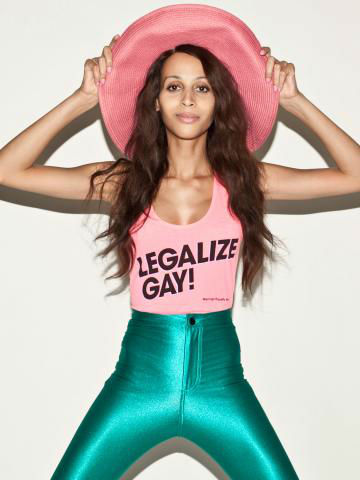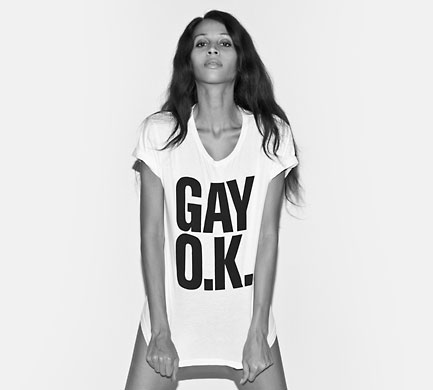So… Isis King has an American Apparel ad.
Isis King, if you’re not aware, is a particularly beautiful (under normative standards) trans woman who appeared as a contestant on Next Top Model.
American Apparel, for Pride Month (which is June in most US Cities, though July up here in Vancouver), have done a series of new ads demonstrating a supposedly pro-LGBT message. “Supposedly” because I’m not sure much effort has gone into the latter two letters. Isis King was recruited as a model, and appeared in the following images:
Which is all well and good, right?
I mean, it’s showing that a trans woman can be beautiful too, and allowing her a position of visibility, and at the same time is promoting a positive message about gay acceptance!
Well…
Here’s the problem: what are the chances that American Apparel would ever print shirts saying “legalize trans!” or “trans O.K.”
King’s presence isn’t to help promote LGBT diversity. It is, as is so often the case, an instance of using trans people to help promote the cause of gay & lesbian acceptance while our own rights are treated as an afterthought, or too controversial to openly address.
What King does is provide a gimmick for American Apparel, and the gay & lesbian community, to help market their product and message. Even in blog posts like this one I’m writing right now, the campaign is given greater and wider visibility via the “controversy” and novelty of Isis King’s inclusion.
Trans is being used as a marketing technique to sell t-shirts and an already widely-achieved mainstream acceptance of gay men and lesbians into middle-class consumer culture, while all kinds of extremely pressing human rights concerns, like the recent epidemic of violence towards trans women of colour like Isis King, or the incarceration of CeCe McDonald, continues to receive not even a fraction of the attention that the already palatable and harmless message of “gay OK” already receives.
These t-shirts are marketable because by and large, our culture already agrees with that message. Isis King is necessary to give the campaign “heat” because vague, imprecise messages of generic gay-acceptance are no longer in any way controversial.
More and more, trans people are being used by the right wing to scare voters away from supporting things like ENDA or other LGBT-positive laws. On Zinnia’s blog you can find an extremely transphobic anti-ENDA ad featuring a deliberately “ugly” trans woman and threatening parents with the possibility of “her” [sic] teaching their children. It wasn’t long ago that simply the threat of gay or lesbian teachers would have been sufficiently scary. Or there were the highly transphobic cartoons disseminated in Alaska that (successfully) were used against the passage of an LGBT anti-discrimination law. And a couple days ago, some right wing American politician or another tried to scare people away from supporting pro-LGBT legislation by claiming that LGBT (as a whole!) is all about undermining the “so obvious, so objective” categories of male and female.
This is a sort of predictable situation. As more people find the message “Gay OK” utterly yawn-worthy in its level of mainstream acceptability, the right needs to exploit deeper hatreds and fears in order to keep people scared of the queer community, and keep them voting republican/conservative/whatever. Trans people are the obvious go-to. I’m not surprised by this, but I am worried that the LGB community may see the “appropriate” or “necessary” response to be to further distance themselves from trans people rather than to push for our acceptance too.
But what does creep me out, and I didn’t quite anticipate, was that the left would use this strategy as well. That as “Gay OK” becomes uncontroversial and mainstream, trans people would become the go-to for helping generate the novelty and controversy and buzz necessary to market their products and campaigns.
I’m just really not fond of exploitation. Especially as I notice it more and more, all the time, amongst those I’d mistakenly considered allies. Good guys. Progressives.
Isis King’s presence in the ad isn’t what matters. Just like it isn’t Green Lantern Alan Scott of Earth 2 being gay that bugged me. What bugs me about things like this is how they’re marketed. Where the motivations are. “LOOK AT OUR TRANS MODEL!!!”, “ONE OF OUR ‘MAJOUR HEROES’ IS COMING OUT OF THE CLOSET!!!” Etc.
Human rights aren’t a commodity. They aren’t novelty. They aren’t controversy. They aren’t a gimmick.
And they aren’t a way to be fashionable.
Call me when you’re willing to show a gay man wearing a “Legalize Trans” shirt.



Isis King did not respond to my tweets on the issue — although her publicist sent me a spam message inviting me to support her in some new film thing she’s doing. No worries. I’m a watcher of #antm and supported what she did there. In particular, I like how she publicly handled the very nasty cissexism she got in the episode in which she was expelled, when a fellow contestant made some ‘no fake woman should ever . . .’ etc. Her response, something like ‘My goal in life is not to prove to other people that who I am is who I am.” I’d say so much of what I wrote about Jenna could be applied to Isis: the doginess of playing is cisgender’s most sacred precincts of norms, judgment, and enforcements . . . but their right to do so. As women.
I am told that AA *does* make a ‘legalise trans’ t-shirt. (Good luck finding it). So this actually annoyed me even more: why isn’t she wearing it? If AA really wanted, in the false nobility that they pride themselves on, wanted to magnify a social issue — chance? lost. Instead we get this anodyne presentation of a relatively safe issue, through a sanitized message, served up for an already convinced audience, all as part of a business transaction. That Isis is involved doesn’t make any difference unless you know who she is — which most people don’t. There’s certainly nothing in the framing here to suggest any kind of gender variance and trans presencing — which is fine. But then why get Isis involved? Well, we know the answer: soft activism with a sales figure attached.
I think I need to order one of these in each colour:
http://www.legalizetrans.com/shop/
(ht to hall of rage)
Missed the last part of your post. The legalize trans* shirts I’ve seen mimic the AA ones, but are made by an independent, trans* run non-profit. I wrote more about it below.
Exactly.
I didn’t know “human rights being fashionable” was a thing until I saw a post about hipster anti-racism: apparently there are people who pretend to be anti-racist because it’s “cool”. 🙁
An enterprising trans person has actually decided to take matters into his own hands and create the shirts (and badges and other things) himself.
http://www.legalizetrans.com/
I’ve spoken with the people behind this a couple of times now at conferences. From what they’ve told me, American Apparel is aware of their existence and have showed no particular interest in taking the design on themselves, but don’t have any particular problem with the design echoes, either.
It actually started as a project to raise money for the founder’s medical care, and they now have an affiliate program for trans folks who want to raise money for their own care.
I really enjoyed reading this post, but I almost missed it because it was surrounded by very long posts that didn’t catch me. Perhaps more bluntness?
A minor annoyance I have is that she’s a straight woman. Yes we all cooperate as the lgbt community, but cis lgb people forget that there are lgb trans people
Yeah, the whole ‘gay ok!’ trope is getting old (read: basically obsolete). Not to sound overly snarky or paranoid here, but I almost detect this seeming prevalent mainstream-culture notion that the rights movement for the LG folks is far behind where it actually is, and I also wonder if that isn’t a deliberate attempt on the part of marketers and such to direct their ‘support efforts’ into relatively safe territory, so to speak, while still appearing committed to social justice. At the end of the day, it’s all about revenue, and if they think that open support of, say, the B and/or T and/or Q and/or etc. will turn customers off, they won’t do it. Even over here in the largely backwards US, according to Gallup as of relatively recently (http://www.gallup.com/poll/147662/first-time-majority-americans-favor-legal-gay-marriage.aspx), the majority of Americans actually favor ‘same-sex’ marriage. I realize that that statistic isn’t by any means indicative of the entire spectrum of attitudes towards LG rights on the whole, but it does suggest that the (cis) LG-identified individuals have much more general public acceptance than other queer people do! I observe/theorize that ‘minority’ movements essentially go through various successive phases of increasing public acceptance, with the speed of progress being dependent upon assorted factors such as visibility, degree of genuine understanding, etc. It seems as if the (cis) LG movement is largely past the level of mere tolerance and well into the realm of actual understanding and active acceptance, whereas the trans* movement is perhaps abstractly somewhere between tolerance and understanding in the very best of places on the very best day. Far to go indeed…
Oh, and Natalie, I hate to be a stickler about this, but if a major retailer (or anyone) were to market those shirts, they’d ideally read, “legalize trans*” or “trans* ok”. That little asterisk is very important. 🙂